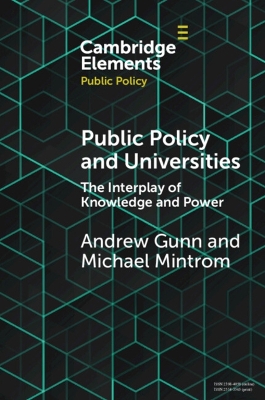Elements in Public Policy
2 total works
Policy entrepreneurs are energetic actors who engage in collaborative efforts in and around government to promote policy innovations. Interest in policy entrepreneurs has grown over recent years. Increasingly, they are recognized as a unique class of political actors, who display common attributes, deploy common strategies, and can propel dynamic shifts in societal practices. This Element assesses the current state of knowledge on policy entrepreneurs, their actions, and their impacts. It explains how various global forces are creating new demand for policy entrepreneurship, and suggests directions for future research on policy entrepreneurs and their efforts to drive dynamic change.
Higher education is undergoing unprecedented transformation. In the global knowledge economy universities are of paramount importance to governments worldwide. This creates a strong rationale for an element exploring how the interactions between universities and the state are being reconfigured, while highlighting the role policy analysis can play in explaining these dynamics. Specifically, this element draws on four theoretical approaches – New-Institutionalism, the Advocacy Coalition Framework, the Narrative Policy Framework, and Policy Diffusion and Transfer – to inform the analysis. Examples are drawn from a range of countries and areas of potential research informed by policy theory are identified. This element features a section dedicated to each of the three main missions of the university followed by an analysis of the institution as a whole. This reveals how universities, while typically seeking greater autonomy, remain subject to a multifaceted form of nation state oversight as they continue to globalise in an uncertain world.

